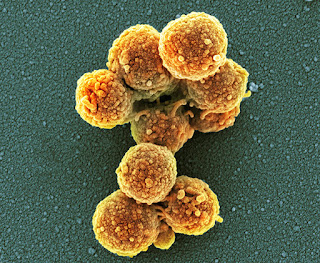 |
| Electron microscope image of the bacterium Mycoplasma mycoides, which could someday be put in a quantum superposition. (Courtesy: Thomas Deerinck, NCMIR/Science Photo Library) |
Topics: Biology, Quantum Mechanics, Schrödinger's cat, Superconductivity, Research
A proposal for putting a living bacterium into a superposition of quantum states has been unveiled by physicists in the US and China. If successful, the experiment would be the first realization – albeit microscopic – of Schrödinger's famous thought experiment involving a cat in a box that is simultaneously alive and dead until an observer makes a measurement by peering into the box. As well as improving our understanding of the foundations of quantum mechanics, the researchers say that their proposed experiment could also yield a new technique for monitoring defects in biological molecules.
Superposition is a quirky property of the quantum world that allows a physical system such as an atom or photon to exist in two or more quantum states, until a measurement is made on it. In recent years, physicists have created superposition states using inanimate objects of increasing size, from electrons and photons to atoms, molecules and even tiny mechanical systems. Now, Tongcang Li* of Purdue University and Zhang-Qi Yin of Tsinghua University propose doing the same thing with a living object – a tiny bacterium – to realize a version of Schrödinger's cat.
The proposal involves a tiny mechanical oscillator built by John Teufel and colleagues at the National Institute of Standards and Technology in Colorado. That oscillator is an aluminium disc 15 μm across and 100 nm thick that forms the upper plate of a capacitor within a superconducting inductor-capacitor (LC) circuit. In 2011 Teufel's group was able to put the mechanical oscillator in its quantum ground state. This was done by first cooling the apparatus in a cryostat and then subjecting the oscillator to "sideband cooling", which involves coupling its mechanical vibrations to microwave radiation.
* Dr. Tongcang Li was Dr. Mark G. Raizen's former PhD student, University of Texas, Austin; my distinct honor to know both gentlemen.
Physics World:
Could 'Schrödinger's bacterium' be placed in a quantum superposition?
Edwin Cartlidge
Comments